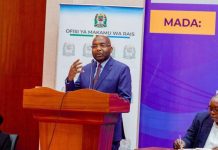Africa-Press – Tanzania. DAR ES SALAAM: VICE-PRESIDENT Dr Philip Mpango has highlighted the necessity of reassessing the tax systems in Tanzania to align with the evolving economic landscape since 1990.
Speaking at the Tax and Investment Forum for the year 2024 in Dar es Salaam yesterday, he stressed the importance of adapting tax policies to accommodate emerging trends, including the integration of small-scale entrepreneurs into the taxation framework.
Representing President Samia Suluhu Hassan, Dr Mpango addressed concerns regarding the perceived hindrance posed by the current tax system to investment and business operations.
“It is now time for the Ministers of Finance and Investment to go to work on the issue. Among the new aspects to examine will be the small-scale entrepreneurs strategy, which was previously absent from the system,” Dr Mpango said.
He acknowledged complaints from both foreign and domestic traders and investors, citing issues such as excessive taxes, unpredictable policies and bureaucratic inefficiencies.
The National Business Council (TNBC) has reported grievances from traders and investors, ranging from the proliferation of taxes to inconsistencies in electronic systems for obtaining permits and licenses.
Dr Mpango highlighted the detrimental impact of non-compliance and tax evasion on the government’s ability to fulfill its obligations to the public.
“For approximately ten years from 2010/2011 to 2022/2023, our tax revenues have increased to a level below 12 per cent of the national income, which falls short of the average rate of 15.6 per cent observed among African nations.
“We must devise strategies to elevate our tax revenue to at least 15 per cent or higher of the national income. Comparable countries within our lower-middle-income bracket have achieved tax-to-GDP ratios exceeding 13 per cent. For instance, Senegal stands at 18.7 per cent, Zambia at 16.8 per cent, Ghana at 14.1 per cent, Cote d’Ivoire at 13.9 per cent and Cameroon at 13.3 per cent,” Dr Mapndo noted
Dr Mpango further said the sixth phase government has undertaken significant reforms to address investor concerns, with over 460 improvements made to policies and tax management systems since 2010.
The VP further underscored the importance of government responsiveness to the recommendations of taxpayers and investors, advocating for a collaborative approach to policy-making.
He said the forum should also highlight the significance of leveraging public-private partnerships and mitigating risks associated with digital tax collection methods, including cyber threats and capital flight.
Chief Executive Officer of the Tanzania Private Sector Foundation (TPSF), Raphael Maganga advised the government to continue widening the scope of taxation.
“It is critical to attract new investments into the nation because it is a sustainable strategy to raise revenue. This investment will create jobs and pay taxes, but it is also critical to open up hitherto untapped economic opportunities, such as the LNG project,” added Mr Maganga.
Mr Maganga further noted that on occasions, taxes fail to mirror the prevailing social and economic conditions. This discrepancy, coupled with complex tax payment procedures, lead to increased costs associated with tax monitoring.
Moreover, he said ensuring transparency and fairness in tax management remains paramount, aligning with the intended accessibility of the tax appeal system to all taxpayers.
He also emphasised the necessity of revisiting tax legislation concerning small-scale entrepreneurs, suggesting the potential differentiation of such laws from basic income tax regulations, aiming to simplify comprehension by articulating them in a straightforward language.
Minister of Planning and Investment, Professor Kitila Mkumbo, stated that investors consider a variety of factors when making investment decisions, but ten fundamental factors include political stability and peace in the respective country, the legal environment and reform, and the certainty of a market for the products produced.
“We have analysed the implementation of the strategy to improve the business environment in the country for the past five years (2019-2023), the government has made changes and improvements to policies, laws and regulations related to tax and non-tax in 665 areas,” Prof Mukumbo stated.
Prof Mkumbo stated that among the changes, 416 improvements intended to create a better climate for business and investment in the nation, and 460 improvements, nearly 70 per cent, were made between 2021 and 2023.
Finance Minister Mwigulu Nchemba stated that there are still obstacles between growing the economy and increasing domestic income, which is why they see the value of bolstering private sector involvement.
“The seller of a product may use the receipt as a discount to sell it to a customer at a lower price; in this case, the buyer is informed that the price will increase if he demands a receipt, but it will decrease if he does not want one. This is just one example of the numerous reasons why voluntary tax payment, particularly the use of Electronic Fiscal Devices (EFD) machines and the issuance of receipts, is still low,” Dr Nchema said.
He added that another issue is that tax is considered only as a concern of the Tanzania Revenue Authority (TRA), saying it is critical that we continue to remind each other that tax is a national issue, lawful and constitutional.
Dr Nchemba went on to say that there have been several explanations for systems downtime or machine damage, and that this is a way utilised by a small number of enterprises to sell items at a price that does not include tax receipts.
For More News And Analysis About Tanzania Follow Africa-Press







